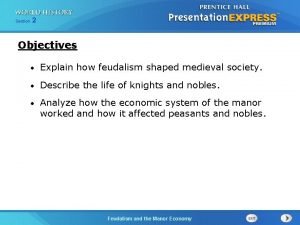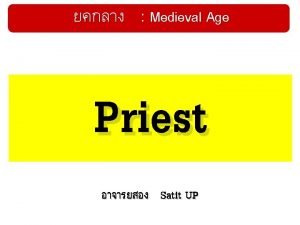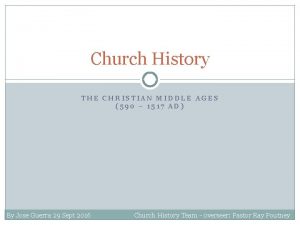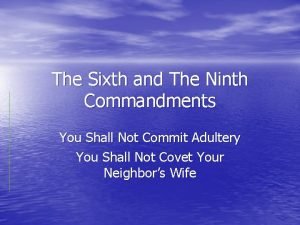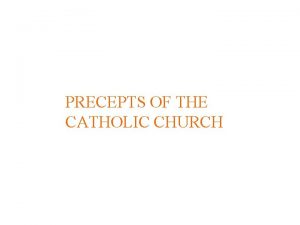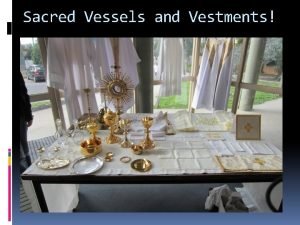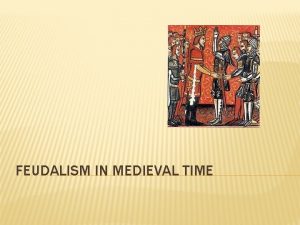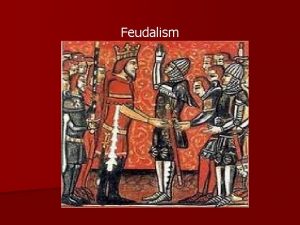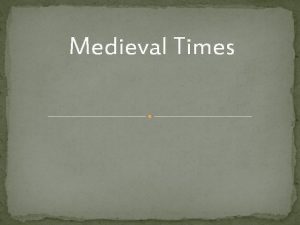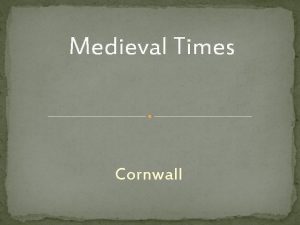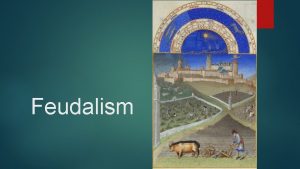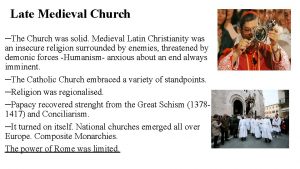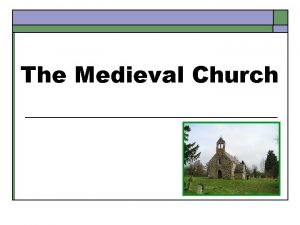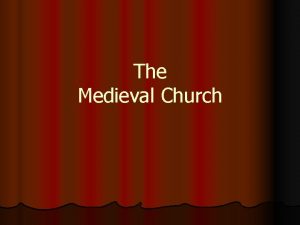WH05 2 Feudalism The Catholic Church MEDIEVAL SOCIETY













- Slides: 13

WH-05. 2 Feudalism & The Catholic Church MEDIEVAL SOCIETY

Why the Middle Ages? ? ? The time between the 5 th and 15 th centuries is called the Middle Ages because…. It’s the time in the MIDDLE, between these guys (Roman Empire) (Antiquity) and these guys (Renaissance) (Modernity)

Why the Dark Ages? ? ? The Dark Ages is a period in Western Europe ● The time after the fall of Rome in Western Europe was rough (the average lifespan was 35 years) ● Very few could read and write (outside of the Church), and no one expected living conditions to improve ● The only hope for most in Europe was Christianity ○ Life in Heaven would be better than life on Earth

The Church Grows Up The Fall of Rome created a power vacuum ○ The Church takes over the central authority ● The Pope became the strongest political leader in W. Europe ○ The Pope claimed spiritual authority over all Christians

Religious Role The Church taught that all were sinners and only through the Church, and Jesus, can you be saved. ● Only Church leaders could read (Latin, the language of the Bible), making them the middle men between God and the people

You Scratch My Back, and I’ll Scratch Yours Monarchs granted favors (land, tax exemptions, immunity in court) to the Church in return for support ● Divine Right of Kings = God grants a leader the right to rule

The Medieval Catholic Church The Church was the unifying force in Europe; many secular (worldly) roles ○ Had immense power over people’s daily lives ○ The church controlled about 1/3 of the land in Western Europe. ○ Heresies (beliefs that were not Catholic), run Inquisition ■ Ordeal: A physical trial (test) used to see if someone was guilty or innocent ○ Collected tithes - 10% tax on your assets given to the church.

A Medieval Monk’s Day

Rise of Feudalism In exchange for military protection, a lord gave a land grant called a fief (<-- This is important). ● Feudalism is based on mutual obligation, or voluntary co-operation from serf to noble ● There was no social mobility (like what else? ) ● Key terms ○ Vassal: person who receives a fief (land) ○ Fief: Gift of land from a lord ○ Serfs: Peasants ○ Tithe = money that serfs paid (tax or rent)

MEDIEVAL ECONOMIC SYSTEM Manorialism (small version of feudalism) ● Economy of the Middle Ages centered around the lord’s manor/estate ■ set of rights & obligations between serfs & lords ■ Peasants worked the land, in return the lord protected them and let them use the land

Medieval Guilds Guild - a medieval association of craftsmen or merchants, often having considerable power ● Commercial Monopoly: ○ Controlled membership ■ apprentice ■ journeyman ■ master craftsman ○ Controlled quality of the product ○ Controlled prices

Medieval CODE OF CONDUCT Chivalry: a complex set of ideals that defined expectations from knights ● Emphasized courage and bravery ● Expected to defend chosen lord, heavenly lord and chosen lady ● Encouraged respect towards women

BECOMING A KNIGHT Training: ○ Page: began at age 7, waited on lord, learned manners & played games ○ Squire: at age 14, became a servant to a knight ○ Knight: at age 21, knighted by king or other high ranking noble ■ Tournaments – mock battles
 How did feudalism shape medieval society
How did feudalism shape medieval society Hierarchy catholic church
Hierarchy catholic church A salaried worker in a guild
A salaried worker in a guild How did feudalism organize society
How did feudalism organize society The medieval church (590-1517 ce)
The medieval church (590-1517 ce) Liturgical vestments meaning
Liturgical vestments meaning Catholic sixth commandment
Catholic sixth commandment Five precepts of the church in malayalam
Five precepts of the church in malayalam Catholic church finchley
Catholic church finchley Protest reformation 1517 1648
Protest reformation 1517 1648 Sacred heart catholic church sauk rapids mn
Sacred heart catholic church sauk rapids mn Vestment in large container
Vestment in large container Why did the catholic church introduce tropes?
Why did the catholic church introduce tropes? Rank in catholic church
Rank in catholic church
